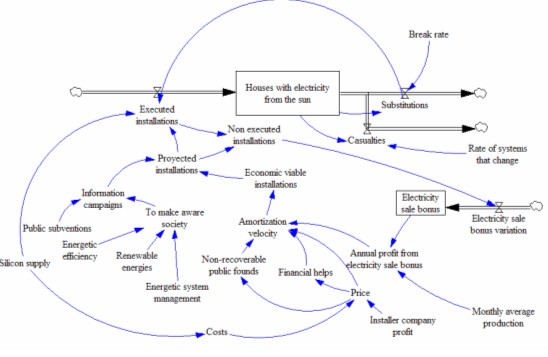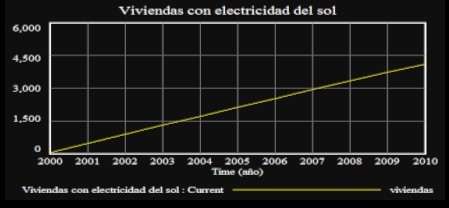
Assessment of Regional Policies of Solar Photovoltaic Energy
A System Dynamics Based Model
Jon Mujika Perea
xaltocan3@gmail.com
Abstract: This paper is a systemic approach for the assessment of regional energy policies in the Basque Country. The work tries to offer an evaluation tool of the Basque Country's government policy in the renewable energies in order to identify the strengths, defects, weaknesses and opportunities that shows the defined model.
Objective of the work:
This paper is a systemic approach for the assessment of regional energy policies in the Basque Country. Evaluation and impact assessment are playing increasingly important role in multilevel goverments with the scope of evaluating their own policy-making processes. But how can the society recognize if the public institutions are carrying out their proyects? This work tries to offer an evaluation tool of the Basque Country's government policy in the renewable energies in order to identify the strengths, defects, weaknesses and opportunities that shows the defined model. The Systems Dynamics methodology makes possible the integration of the economic, social and environmental variables in a single escenario and gives a clear idea of the elements and their relations that are taking part, making the assessment understandable and useful for the society.
The energy sector has a great significance in all areas developmet of a region. In 2.000 the Basque Government planned an energy programme for the next ten years. The Basque Country Energy Strategy 2.010 analyzed the previous state, identified the general and sectorial energy goals and it drew up the strategies to follow in order to achieve them. This programme will be the general framework of our study.
We will focus our assessment in the renewable energies because of the fundamental role they play in the complete sustainable development of a society. And specifically we will measure the solar photovoltaic installations that are being started up in the Basque Country in the next 10 years to the approval of the energy strategy. This signficant variable imply outstanding consequences in all social, environmental and economic areas as we will point out further on. The ideal state set up for the renewable energy was to pass from the initial 4,2% demand to the 12% required by the European Union's agreements and according to Kyoto Protocol's aims. This strategy established that the solar photovoltaic installed power capacity has to be increased 76 times from the initial 139 Wp installed.
In the beginning of the exercising of solar photovoltaic energy in the Basque Country principally were low power installations that covered the electricity necesities of isolated houses in the mountains. But nowadays the 5 kWp installations are becoming more usual due to a faborauble Spanish State law for the electricity sale bonus from renewable energies. Our study reference will be 3 kWp house installations that cover one family electricity necesities and underlines two of the most important issues of renewable energies: electricity distributed generation and social awareness of energy consumption.
The number of these installations decreases when a house decides to change the electricity supply system to another energy resource or connect it to the electric grid. With the pass of the years some technological elements are also broken and they need a substitution. On the other hand the new installations that every year are started up depend on several factors agrupated in two important branches: the economic viability and the education.
To the initial cost of the electric system we have to rest the non-recoverable founds that are taken from the Basque government and the total amount of financial helps from the Spanish government. Every year's estimated average production permits the owner to recover the inversion; not in a short term, as in common market inversions, but with the security that 575% from the average price sale bonus give for 25 years.
Goverment's information campaigns play a basic role for the achievement of the aim. Publishing different institutions' subventions can persuade people to make the investment required. But education efforts in renewable energies' technological and management aspects are absolutly necessary if the main objective is to change the energetic framework.
At the same time Silicon supply is becoming more difficoult and this influences photovoltaic panels' market price and it can delay new proyects. The difference between executed installations and proyects is the mean reason why Spanish government is thinking of reducing electricity sale bonus for the solar sector.

The elements that affect the solar photovoltaic installations are analyzed from two perspectives more in depth in the paper. In the first one we describe the influence of education and economic values in society's energetic choise and in the other one we identify which elements are under Basque government's decision making in order to point out the weaknessses, strenghts and opportunities of its policy.
At last, the documents concludes that taking as reference the 'Business as usual' scenario, this means that no intervention has to be done in established factors, the setted goal of 4.116 installations ( 12.348 kWp) is going to be achieved as the grafichs shows:

Studying the data that this scenario gives us in detail, we notice that a big initial inversion is necessary to instal these energy systems so if we analyze the society's access to this resource a lack of 'democratization' is observed.
Changing initial conditions the results can be very different. Recently the Spanish government has withdrawn the non-recoverable founds for solar photovoltaic installations connected to the electrid grid. If the Basque government follows this policy the number of installations in the 2.010 would be 1.014, far away from the 3.555 expected.
Education policies' strength and Silicon supply variation is also shown with different escenarios in the paper.
|